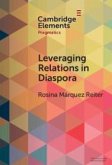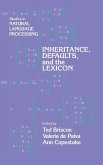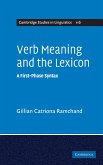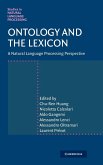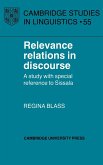Handbook on semantic relations between words, and different approaches to how these are mentally represented.
Semantic Relations and the Lexicon explores the many paradigmatic semantic relations between words, such as synonymy, antonymy and hyponymy, and their relevance to the mental organisation of our vocabularies. Drawing on a century's research in linguistics, psychology, philosophy, anthropology and computer science, M. Lynne Murphy proposes a new, pragmatic approach to these relations. Whereas traditional approaches have claimed that paradigmatic relations are part of our lexical knowledge, Dr Murphy argues that they constitute metalinguistic knowledge, which can be derived through a single relational principle, and may also be stored as part of our extra-lexical, conceptual representations of a word. Part I shows how this approach can account for the properties of lexical relations in ways that traditional approaches cannot, and Part II examines particular relations in detail. This book will serve as an informative handbook for all linguists and cognitive scientists interested in the mental representation of vocabulary.
Table of content:
Acknowledgements; Symbols and typographical conventions; Part I. Paradigmatic Relations, Generally: 1. Why lexical relations?; 2. A pragmatic approach to semantic relations; 3. Other approaches; Part II. Paradigmatic Relations, Specifically: 4. Synonymy and similarity; 5. Antonymy and contrast; 6. Hyponymy, meronymy and other relations; 7. Lexicon and metalexicon: implications and explorations; Appendix: relation elements; Notes; References; Index.
Hinweis: Dieser Artikel kann nur an eine deutsche Lieferadresse ausgeliefert werden.
Semantic Relations and the Lexicon explores the many paradigmatic semantic relations between words, such as synonymy, antonymy and hyponymy, and their relevance to the mental organisation of our vocabularies. Drawing on a century's research in linguistics, psychology, philosophy, anthropology and computer science, M. Lynne Murphy proposes a new, pragmatic approach to these relations. Whereas traditional approaches have claimed that paradigmatic relations are part of our lexical knowledge, Dr Murphy argues that they constitute metalinguistic knowledge, which can be derived through a single relational principle, and may also be stored as part of our extra-lexical, conceptual representations of a word. Part I shows how this approach can account for the properties of lexical relations in ways that traditional approaches cannot, and Part II examines particular relations in detail. This book will serve as an informative handbook for all linguists and cognitive scientists interested in the mental representation of vocabulary.
Table of content:
Acknowledgements; Symbols and typographical conventions; Part I. Paradigmatic Relations, Generally: 1. Why lexical relations?; 2. A pragmatic approach to semantic relations; 3. Other approaches; Part II. Paradigmatic Relations, Specifically: 4. Synonymy and similarity; 5. Antonymy and contrast; 6. Hyponymy, meronymy and other relations; 7. Lexicon and metalexicon: implications and explorations; Appendix: relation elements; Notes; References; Index.
Hinweis: Dieser Artikel kann nur an eine deutsche Lieferadresse ausgeliefert werden.




